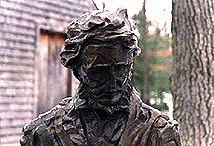 I had no quarrel with my roommates during our cross-country drive to Montana. It was all novelty – blues bars in Chicago, the world’s largest hockey stick in Minnesota, fields of sunflowers turning their faces to the West in North Dakota, a Rastafarian family at a natural hot springs in Oregon, pitching a tent in the parking lot of a senior citizen’s center. But when we finally arrived to our rented house, it occurred to me that they were doing everything wrong, especially in the kitchen. Bowls go on the shelf below plates. Cups go to the left cabinet. Bread belongs in the refrigerator – the cupboard is for snacks! But Dan wanted the bowls ON the plates, the garbage can beside hallway, canned goods in the cup cabinet. We gaped at each other’s fundamental lack of understanding and, despite our conscious compromises, absentmindedly placed our kitchen supplies in the kitchens of our childhoods.
I had no quarrel with my roommates during our cross-country drive to Montana. It was all novelty – blues bars in Chicago, the world’s largest hockey stick in Minnesota, fields of sunflowers turning their faces to the West in North Dakota, a Rastafarian family at a natural hot springs in Oregon, pitching a tent in the parking lot of a senior citizen’s center. But when we finally arrived to our rented house, it occurred to me that they were doing everything wrong, especially in the kitchen. Bowls go on the shelf below plates. Cups go to the left cabinet. Bread belongs in the refrigerator – the cupboard is for snacks! But Dan wanted the bowls ON the plates, the garbage can beside hallway, canned goods in the cup cabinet. We gaped at each other’s fundamental lack of understanding and, despite our conscious compromises, absentmindedly placed our kitchen supplies in the kitchens of our childhoods.
My subconscious refusal to shelve cups alongside plates is not just passive-aggressive behavior – it’s a reflection of my cognitive map. According to Melissa Holbrook Pierson’s The Place You Love Is Gone, your brain forms a cognitive map when you first view a place, and, given the novelty and sensory intensity of a child’s early experiences, memories from your first six years of “home” have a fundamental impact on your inner map. Pierson cites the Oliver-Sacks-esque case of A. Kirschman, a native of Germany’s Oberstein an der Nahe who was distressed by his perception that, in every place outside of his hometown, the sun set in the east, rather than the west.
Pierson beautifully reiterates the persistence and logistical impossibility of the human desire to rebuild our idyllic past; she also has a great deal to say about the psychological and biological basis of our bonds to a hometown, and the problematic notions of “wilderness” and “progress” in the American landscape. But her book is rooted in the past, as she insists all individuals are, fundamentally.
I don’t deny my roots, nor my compulsive reiteration of my inner geography. And, though I’m working on getting an interview with BU’s Center for Memory and the Brain, I don’t know enough about neuroscience to make this statement. But metaphorically, at least, I insist on the brain’s ability to form integrated, adaptable maps through travel. You know where I’m going with this. Travel reintroduces novel experience, expands our sense of possibility, etc., etc. Our sense of physical orientation, of the feng shui of home, is probably already set, but our sense of how the world can, should, or does work can always be modified.
Each time I leave my latest “home,” I expand my sense of possibility. Some possibilities are ugly. It is possible for a father to pimp out his twelve year old daughter for rent. It is possible to speak five languages and still be mocked for your ignorance. But it is also possible to base a career on German stick-fighting, to actively protect rainforest habitats, to dip one’s fries in peanut butter. (Not to scale, admittedly, but a revelation, nonetheless). Two underpaid Irish metal workers I met in Amsterdam managed to budget an international excursion every two months; mummified corpses and a perpetuity tax in Guanajuato revealed a new face in the business of death; a former Israeli soldier wore high heels on our hike through Patagonia. The world is strange.
Childhood is a time when it is easy to believe in the world’s raw potential, that anything is possible. As a species, we are running out of physical frontiers –even Antarctica comes equipped with a gift shop – but psychological exploration, our ability to draw new cognitive maps, is infinite. Adulthood is the time to make that potential kinetic, to broaden your knowledge of what is, what can be made.
The answer may not lie in physical wilderness. Thoreau went to the woods to live deliberately; as Pierson notes, “the woods” are shrinking, and even back-to-the-land literary movement is overpopulated. So ignore the woods, ignore the example of Huckleberry Finn, who “lights out for the territory” that his creator knows will be “civ’lized” soon after he arrives. You can’t go home again, so venture to the neighbor’s place instead. Rezone your interior map. You can bring a snack from your past – made the right way, of course – but, by all means, leave the kitchen.



